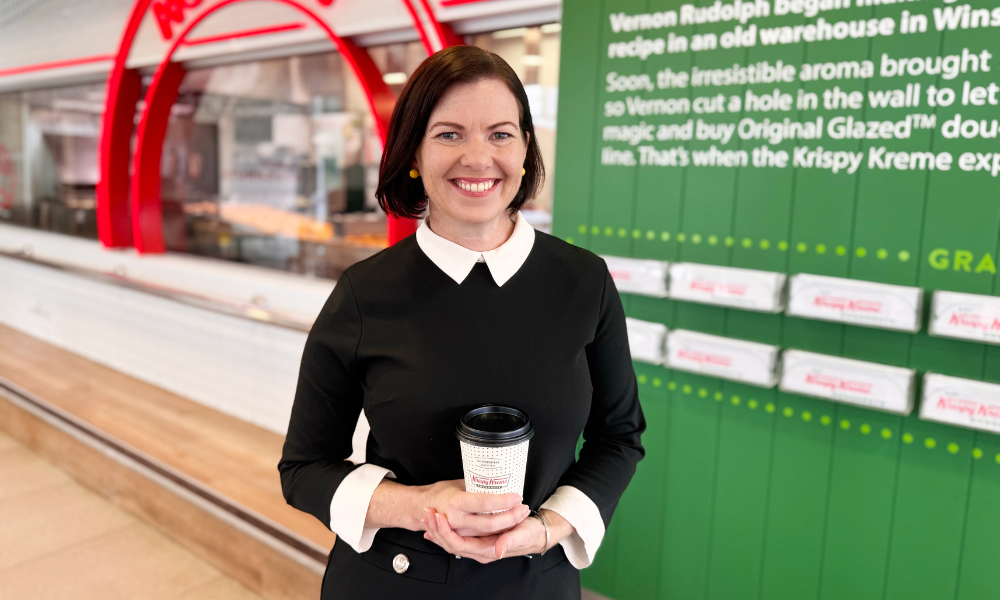
Peta Neilsen spoke to HRD about her 'sweet' people management career

Krispy Kreme's recipe for success is consistency with a local twist and what works for doughnuts can also work for team management.
As international doughnut day approaches on June 6, HRD spoke to Krispy Kreme's Chief People Officer for Australia and New Zealand, Peta Neilsen, about having creative freedom to design initiatives that are “fit for purpose”.
“Most global companies see HR programs designed centrally and then cascaded to local markets for implementation,” Neilsen told HRD. “Things are different here – we make sure our initiatives reflect local need, cultural nuances, and our people.”
Neilsen, whose professional career spans nearly 20 years including at National Australia Bank (NAB), said local initiatives lead to a greater sense of involvement and engagement from employees.
One example of this is the company’s local ‘Recognition Strategy’ - an initiative unique to Australia and New Zealand.
“We have a very strong ‘kudos culture’ – so our strategy includes a program called Doughlympics that celebrates our team’s talents and fosters camaraderie, reinforcing our commitment to ensuring Krispy Kreme ANZ is a sweet place to work." she said.
"This is a bespoke recognition program for our field team and in 2023, this program won the QSR award for Best Recognition Program. We’ve since presented the success of this program to our global peers and packaged up the playbook for interested markets.”
Neilsen said HR teams were encouraged to share best practices, programs and successes that could potentially be rolled out in other markets.
"If we identify a common challenge or opportunity, we will pull together project teams with representatives from across the markets to solve it together. It's the best of both worlds - local ownership plus the ability to harness the collective brainpower of brilliant HR minds across the globe,” Neilsen added.
Neilsen’s professional career started out in Europe having studied international business and German, before moving to Germany to work for a shipping line in financial controlling. Her favourite part of the role was dealing with people all over the world, which sparked her love for people management.
“When you’re working across markets, you learn about so many different problems – and you don’t always know how to fix them. It gave me energy and purpose,” Neilsen told HRD.
She studied a Master of Business in HR after becoming a recruiter – to ensure she had all necessary skills to help get people jobs. It’s here, Neilsen noted, that she gained further insight into how businesses of all sizes operate their HR function.
“HR really spoke to me – and if I was responsible for getting people to work in the space, I had to know all I could. Through educating myself and immersing myself in the industry, I became hooked. It's just fascinating that you can have one profession but so many different types of experiences.”
Like making doughnuts, Neilsen noted many ingredients go into successful leadership and people management – which can take more than one person to get right.
“You’ve got to appreciate difference and respect all opinions – that’s the most important thing. We’re lucky that we have so many different views because we’re a global company and being able to lean on that to influence your people management practice is invaluable," she said.
“Harnessing collective brainpower and coming up with something that benefits not just your region, but others too, allows us to ensure we’re providing the best for our people. Nothing should be done for the sake of doing it – if something isn’t fit for purpose or isn’t relevant, I’ll call it out,” Neilsen added.
Findings from Deloitte echo this sentiment, stating human collaboration is more important than ever in the face of a technological advancement of artificial intelligence.
“Well-honed human capabilities are more important than ever to employability, making their development an increasingly valuable piece of EVP,” the research finds.
Neilsen believes her openness and authenticity are key factors that make her a successful people manager – as well as her passion for helping others and having a “fingerprint” on the legacy of companies she works for.
“Curiosity goes hand in hand with passion,” Neilsen said, “because to be the best leader possible you need to learn. I learn with every conversation and goes back to my earliest opportunities in my career. If you don’t know the answer, you go out and find it.”
“It goes back to collaboration, too. I encourage brainstorming, discussions, thinking out loud. Collective brain power is the key to any successful decision or initiative. Knowing that the change you’re implementing on a business will have a lasting impact is so powerful to me.”